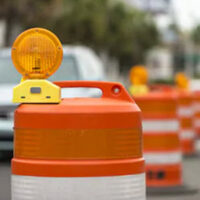Philadelphia Road Construction and Car Accidents: Who Is Responsible When Barriers Fail?

Philadelphia drivers are no strangers to road construction. From Center City to the outskirts of Montgomery and Bucks Counties, construction zones are a daily obstacle for commuters. While roadway improvements are essential, the presence of work zones introduces new risks for motorists. When signage is unclear, barriers are misplaced, or detours are poorly designed, the potential for serious accidents increases sharply. When a crash occurs under these circumstances, a critical question arises: Who is responsible?
Determining liability in construction-related car accidents is more complex than in typical collision cases. Multiple parties—including municipal agencies, contractors, subcontractors, and third-party engineering firms—may share responsibility for the unsafe conditions that contributed to the crash. If you’ve been injured in an accident involving road construction, consult a Philadelphia personal injury lawyer to understand your legal rights and the liability landscape, which are essential to recovering full compensation.
How Construction Zones Contribute to Car Accidents
Work zones are inherently dangerous for drivers. They may feature sudden lane shifts, narrowed lanes, confusing signage, abrupt stop-and-go traffic, construction vehicles entering and exiting the roadway, or even pedestrians working close to live traffic. While drivers are expected to use extra caution in these areas, the agencies and companies responsible for the site must also ensure the area is reasonably safe.
Unfortunately, accidents often happen because the work zone itself is poorly managed. Examples include:
- Missing or damaged barriers
- Confusing or contradictory detour signs
- Poor lighting in nighttime construction zones
- Lack of warning signs for lane closures
- Abrupt transitions in road surfaces
- Inadequate separation between live traffic and construction workers or equipment
These hazards can lead to rear-end collisions, side-swipe accidents, or vehicles veering off the road entirely. When this happens, responsibility may extend beyond the drivers involved.
Who Can Be Held Liable?
Municipal Liability
In many construction-related crash cases, the city or a government agency (such as the Pennsylvania Department of Transportation or a local municipality) is involved in planning or overseeing the roadwork. Under Pennsylvania law, municipalities can be held liable for injuries caused by dangerous road conditions when those hazards stem from negligent maintenance or oversight.
However, suing a government entity requires strict compliance with the Pennsylvania Sovereign Immunity Act or the Political Subdivision Tort Claims Act. These laws cap damages and impose notice requirements. If the city failed to provide adequate signage, authorized a faulty detour, or failed to supervise contractors properly, it could be liable for resulting injuries.
Contractor and Subcontractor Liability
Often, roadwork is carried out by private contractors hired by the city or state. These companies may be responsible for implementing traffic control measures, erecting signage, and placing physical barriers. If a contractor fails to follow established safety guidelines or misplaces critical signage, they may be held liable for any resulting accidents.
Subcontractors, who may be responsible for specific aspects of the project—such as line painting, equipment delivery, or barrier installation—may also bear responsibility. Identifying which party was responsible for which aspect of the work zone is critical to determining who may be liable.
Third-Party Design or Engineering Firms
Some work zones are developed based on plans drawn up by engineering or consulting firms. If those designs were inherently unsafe or failed to account for traffic patterns, weather conditions, or visibility, the design firm itself could be at fault. Claims against such firms often require expert testimony to prove that the plans deviated from accepted safety standards or industry practices.
Proving Negligence in a Construction Zone Crash
Establishing liability in a construction-related car accident requires evidence that a party breached a duty of care and that this breach directly caused the accident. In practice, this often involves:
- Photographs of the accident scene and any signage or barriers involved
- Eyewitness testimony from drivers or construction workers
- Traffic camera or dashcam footage
- Work orders, maintenance logs, or project plans
- Expert testimony regarding traffic control and safety standards
These elements help build a clear picture of whether the responsible party created or allowed an unreasonably dangerous condition to persist.
Special Deadlines and Notice Requirements
When a municipality is involved, Pennsylvania law requires that written notice of the claim be provided within six months of the accident. Failing to file this notice can bar your claim entirely. Private contractors and engineering firms are subject to standard personal injury deadlines (generally two years from the date of the accident), but early investigation is still vital.
Contact The Villari Firm
If you were injured in a car accident involving a Philadelphia construction zone, do not assume the crash was simply bad luck. Many of these accidents stem from preventable errors in planning, signage, and site management. The Villari Firm has extensive experience investigating and litigating complex injury cases involving public and private defendants.
Contact The Villari Firm today for a free consultation. We can help you determine who is responsible, preserve critical evidence, and pursue the full compensation you deserve.
Sources:
legis.state.pa.us/WU01/LI/LI/CT/HTM/42/00.085..HTM
osha.gov/sites/default/files/publications/osha2254.pdf
